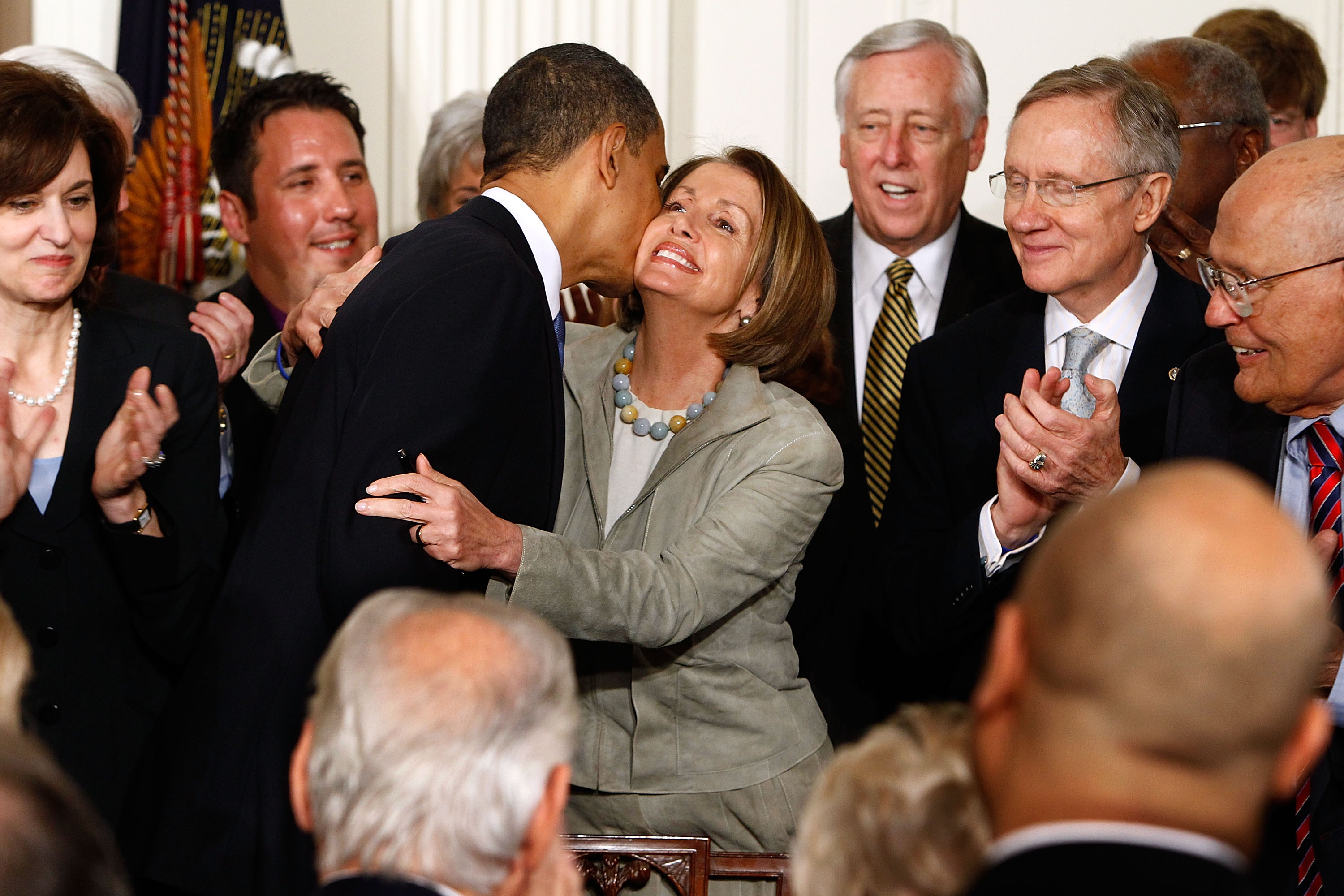Nancy Pelosi was right about ObamaCare. So was Ted Cruz.
With another government shutdown looming, it's worth revisiting the lessons of the last one


A free daily email with the biggest news stories of the day – and the best features from TheWeek.com
You are now subscribed
Your newsletter sign-up was successful
With another government shutdown looming, it's worth revisiting the last one.
Recall, in 2013, when Sen. Ted Cruz (R-Texas) damned the torpedoes in a misbegotten, but ultimately harmless, effort to defund ObamaCare. Everyone knew how it would end: The public would blame Republicans, who would subsequently capitulate, and the implementation of the Affordable Care Act would continue apace.
So let it be stipulated: The Cruz-engineered shutdown was tactically dumb.
The Week
Escape your echo chamber. Get the facts behind the news, plus analysis from multiple perspectives.

Sign up for The Week's Free Newsletters
From our morning news briefing to a weekly Good News Newsletter, get the best of The Week delivered directly to your inbox.
From our morning news briefing to a weekly Good News Newsletter, get the best of The Week delivered directly to your inbox.
But was he wrong on substance? Not really.
In a July 2013 speech at the Western Conservative Summit, the Texan warned: "On Jan. 1, the exchanges kick in and the subsidies kick in. Once those kick in, it's going to prove almost impossible to undo ObamaCare. The administration's plan is very simple: Get everyone addicted to the sugar so that ObamaCare remains a permanent feature of our society."
Set aside Cruz's tendentious characterization of ACA premium support as "sugar." Wasn't he right that ObamaCare — that is, a financial commitment by the federal government to ensure broad access to health insurance — would become a "permanent feature of our society" if it were implemented?
President Trump and the GOP Congress just spent the better part of 2017 falling all over themselves trying to repeal and replace — or skinnily repeal and sorta replace at a later date — ObamaCare. They failed spectacularly. The reason they failed was simple: The idea of taking away health coverage, or money people use to buy health coverage, is enormously unpopular!
A free daily email with the biggest news stories of the day – and the best features from TheWeek.com
Ted Cruz was right. Once Americans get hooked on a benefit, it is all but impossible to take that benefit away.
Which prompts us to recall another lawmaker who was proved right about ObamaCare: Nancy Pelosi. Google the words "Pelosi" and "ObamaCare." You'll find all manner of contemporaneous commentary about the then-House speaker's remark that "we have to pass the bill so that you can find out what is in it." At the time — 2010; lordy, how long ago it seems — the conservative infotainment complex pounced on Pelosi's words as an unintentional confession that she and other Democrats were unfamiliar with the contents of the Affordable Care Act. In context, however, it was clear Pelosi was saying that voters were being subjected to misinformation about the bill — and that they would like it once the partisan dust settled. She was saying that — follow me out on a limb here — voters would like ObamaCare once the "sugar" kicked in.
Shocking as it may seem, Pelosi and Cruz were singing different versions of the same song: Most people will conclude that they do in fact like sugar — and they won't take kindly to attempts to take it away. By April of this year, ObamaCare found favor with a majority of Americans for the first time in its existence, according to Gallup. Indeed, the law is more popular than the president, the vice president, the media, and both major parties.
None of this is to say there aren't real problems with ObamaCare, or that it's no longer under threat legislatively or administratively. There are. And it is. But despite this uncertainty, I predict that ObamaCare, in one form or another, is here to stay — just like a San Francisco liberal and a Texan right-winger told us.
Who says bipartisanship is dead?
Scott Galupo is a freelance writer living in Virginia. In addition to The Week, he blogs for U.S. News and reviews live music for The Washington Post. He was formerly a senior contributor to the American Conservative and staff writer for The Washington Times. He was also an aide to Rep. John Boehner. He lives with his wife and two children and writes about politics to support his guitar habit.
-
 The Olympic timekeepers keeping the Games on track
The Olympic timekeepers keeping the Games on trackUnder the Radar Swiss watchmaking giant Omega has been at the finish line of every Olympic Games for nearly 100 years
-
 Will increasing tensions with Iran boil over into war?
Will increasing tensions with Iran boil over into war?Today’s Big Question President Donald Trump has recently been threatening the country
-
 Corruption: The spy sheikh and the president
Corruption: The spy sheikh and the presidentFeature Trump is at the center of another scandal
-
 The billionaires’ wealth tax: a catastrophe for California?
The billionaires’ wealth tax: a catastrophe for California?Talking Point Peter Thiel and Larry Page preparing to change state residency
-
 Bari Weiss’ ‘60 Minutes’ scandal is about more than one report
Bari Weiss’ ‘60 Minutes’ scandal is about more than one reportIN THE SPOTLIGHT By blocking an approved segment on a controversial prison holding US deportees in El Salvador, the editor-in-chief of CBS News has become the main story
-
 Has Zohran Mamdani shown the Democrats how to win again?
Has Zohran Mamdani shown the Democrats how to win again?Today’s Big Question New York City mayoral election touted as victory for left-wing populists but moderate centrist wins elsewhere present more complex path for Democratic Party
-
 Millions turn out for anti-Trump ‘No Kings’ rallies
Millions turn out for anti-Trump ‘No Kings’ ralliesSpeed Read An estimated 7 million people participated, 2 million more than at the first ‘No Kings’ protest in June
-
 Ghislaine Maxwell: angling for a Trump pardon
Ghislaine Maxwell: angling for a Trump pardonTalking Point Convicted sex trafficker's testimony could shed new light on president's links to Jeffrey Epstein
-
 The last words and final moments of 40 presidents
The last words and final moments of 40 presidentsThe Explainer Some are eloquent quotes worthy of the holders of the highest office in the nation, and others... aren't
-
 The JFK files: the truth at last?
The JFK files: the truth at last?In The Spotlight More than 64,000 previously classified documents relating the 1963 assassination of John F. Kennedy have been released by the Trump administration
-
 'Seriously, not literally': how should the world take Donald Trump?
'Seriously, not literally': how should the world take Donald Trump?Today's big question White House rhetoric and reality look likely to become increasingly blurred
